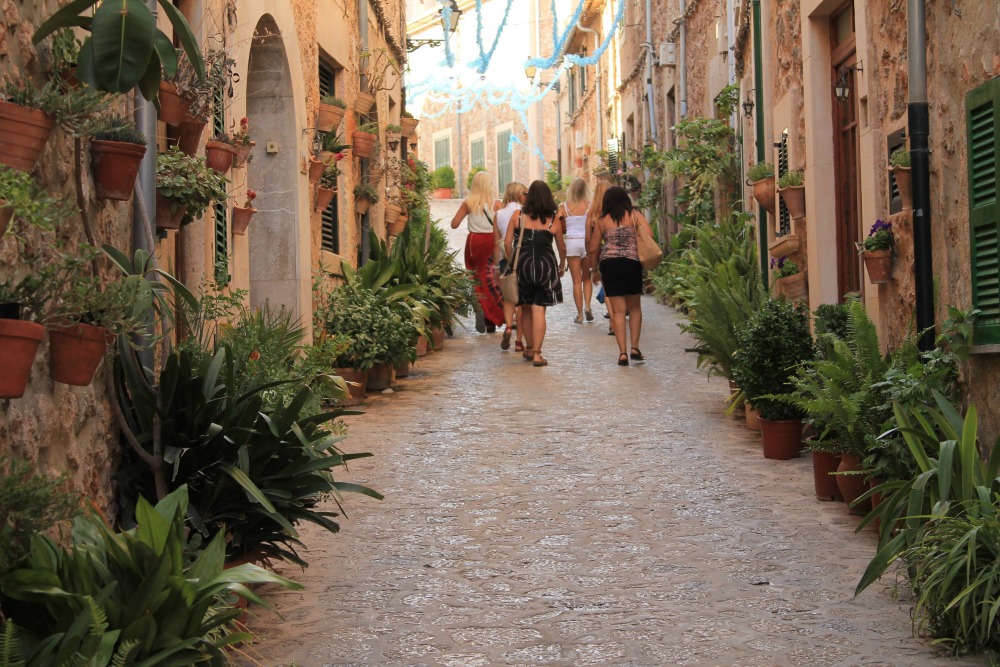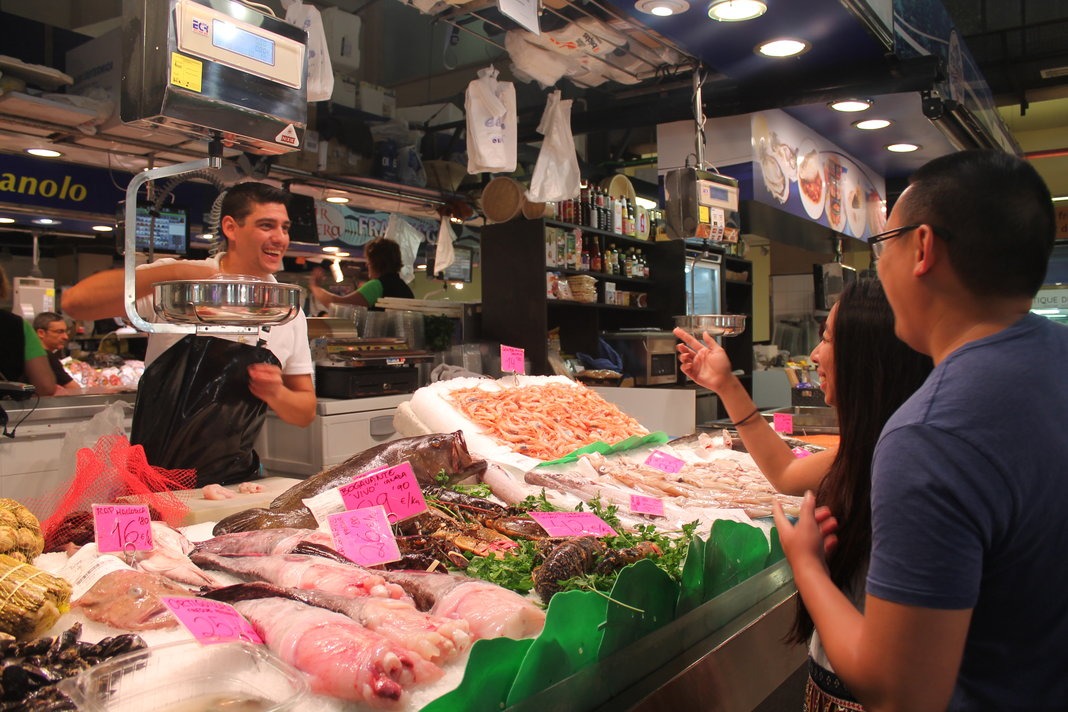
Mallorca thrives on tourism. We know. But in recent years something has changed. Locals — and even tourists — are becoming far less enthusiastic about traditional tourism coming to the island. There have been “anti-tourism” neighbourhood movements in Palma (and all around Europe). Tourists complain that there are too many other tourists (the irony is not lost on us). Locals are struggling with unaffordable rent increases due in part to Airbnb, as well as because of the many foreign families buying up properties and second homes all over Mallorca.
Overtourism stresses not only Mallorcan local life, but also the island’s natural resources. What’s more, the companies that tend to benefit the most from mass tourism are the big hotel chains, low-cost flight companies, cruise ships, etc. The situation is complex, and well worth a longer discussion. But for now, I just want to help you, ethical travellers, to feel welcome on our island and to feel that you have left a positive impact behind you. Just a few simple changes to how we travel can make all the difference — and ignite a bigger change that all of us, locals and travellers alike, can be a part of and can equally benefit from. These tips are customised to Mallorca, but really can apply to any place that you visit.
If you can, try to learn some basic words in our Catalan language for use in the villages, or even just some Spanish phrases for use in Palma. Attempting the language will help locals feel closer to you, because the effort is seen as a way of learning and respecting the local culture. You might even get better tips from locals just because you attempted to ask your questions in Catalan or Spanish! You will feel more like a local and they will very much respect your efforts.
Avoid approaching people in the streets and asking questions straight away in your own language (whether that’s English or German, or any other language that’s not local). Instead, ask them in Spanish, “Perdón, hablas inglés?” or “Perdón, hablas aleman?” (or whatever language you need). If they say yes, only then should you switch to your own language. Remember, you are in Mallorca, not the UK or Germany or Australia, so people are not expected to speak your language. Assuming they can only serves to make locals feel foreign in their own country.
If you are lucky enough to choose your holiday period, try to travel to Mallorca in low season (November, December, January, February) or shoulder season (March, April, May, June, September, October). Try to avoid the high season of July and August. You’ll be able to better enjoy Mallorca in a more authentic way when there are fewer tourists around (plus, it’ll be cheaper). Mallorca has a lot of culture, historic villages and castles, beautiful nature, delicious wines, great culinary traditions, wonderful hiking trails and local festivals to offer — all still available outside of high season.

Go to Mallorca in the low season and you’ll see sites like the almond trees blossoming in winter | Photo by Mallorca Urban Adventures
If you want to experience the real Mallorca and support the local people, avoid massive all-inclusive hotels. Your money will better benefit the community if you spread it among small, family-run restaurants, hotels, tour activities, public transportation, transfers, etc. Not only will you be supporting the independent local businesses, but you’ll also have a more authentic experience with delicious food, unique sites and great people.
When you’re in Palma city centre, walk to the side of the street, not down the middle. There are many streets within the city that are pedestrian-friendly, but local cars and public transit still have the right to pass through. So stay to the side. Remember that the local residents are still going to and from work every day, and they don’t want to dodge oblivious tourists while they’re trying to go about their daily routine.
If you really want see how locals live here, then use the public transportation system. There are public buses for the Palma metropolitan areas (EMT) and public buses from Palma for all around Mallorca (TIB). The EMT buses are frequent but you’ll sometimes have to stand. The TIB buses are normally clean, with a spot for all passengers, and with air conditioning in summer and heat in winter. Typically, buses run every hour or so — you’ll need to check the schedule for your route to plan your day.
If you don’t like to walk and public transportation doesn’t appeal to you, then skip the taxis and rent a bike for getting around Palma and the surrounding area. You’ll be able to explore the town and the coastline while being kinder to the environment. There is a beautiful bike lane along the coast that goes from Palma to S’Arenal, passing throught Portixol; and from Palma to Portopí, along the harbour.

Find the hidden swim spots away from the all-inclusive pools | Photo by Mallorca Urban Adventures
Don’t waste the water. The island may be surrounded by the (salty) sea but it has limited fresh water and it typically only rains here a few times per year. Which means we have to conserve our water. But you’ll still see swimming pools, green golf courses and flowing fountains — we desalinise the salt water for these features. But to locals, it is a pity seeing this. With so much beautiful nature all around, we want to see people swimming in the sea and appreciating the natural landscape rather than artificial grounds that have to be maintained with our limited water supply.
Avoid the tourist restaurants and enjoy the fresh foods from the local markets or discover the many small restaurants all around the island — especially in the countryside villages. Trust us, it won’t be hard to find small, independent places to eat. When I travel, I love to taste local food and drinks, and yet I see so many tourists going to restaurants serving international cuisine that you could find anywhere in the world. Sample some of our traditional dishes and learn about our culinary history and culture.

Visit the local market to discover the real flavours of Mallorca | Photo by Mallorca Urban Adventures
If you want to buy a good souvenir, I advise you to look for local handmade products. You’ll be helping a local artisan to make a living from his art, plus you’ll have high-quality product instead of a low-cost version that falls apart within five minutes of buying it. There are straw baskets, fabrics, glass products, wood products, local wines — take the time to visit their workshops and learn the history behind these products.
When you leave the beach for the day, take everything with you. Remember, you’re in a beautiful, natural space that belongs to everybody. Even better: leave the beach (or hiking trail or wherever you are) better than you found it. If every visitor collected one piece of plastic from the beaches and sea, the island would be so much better than it is now. Too many visitors leave their garbage on the beach, and let plastic bags fly away in the wind. If you see a bag left behind, pick it up — even if it’s not yours. It takes a few seconds and can make a big difference. Plus, you’ll be setting a good example for the people around you, without having to say anything. I do it every time I go to the beach and I feel so good with such a small effort.